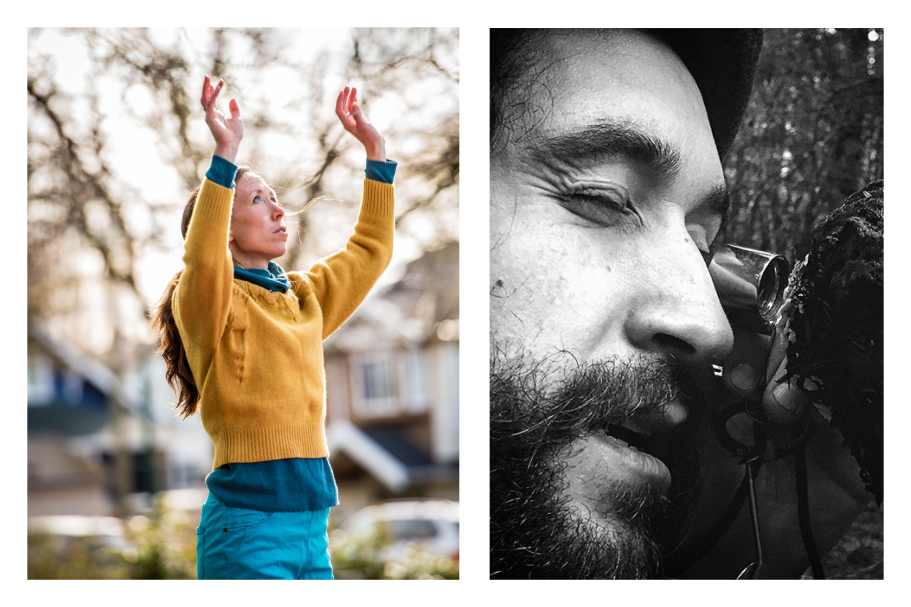Carte blanche: conversation with Isabelle Kirouac and Willoughby Arévalo
This season, we are placing a strong emphasis on creation, by giving carte blanche to a the duo formed by Isabelle Kirouac and Willoughby Arévalo. At the heart of their approach: the development of an immersive work on ecology and fungal life.
Can you present your artistic approach?
Isabelle Kirouac: I earned a Master of Fine Arts from Simon Fraser University. My work has always existed at the intersection of different disciplines. In dance, for example, I’m deeply inspired by sound and sensation. My first dance practice was contact improvisation—communication through touch. More recently, I’ve been studying scent, specifically experimental perfumery. What draws me most is sensory work, and immersive performance experiences.
Willoughby Arévalo: I’m a visual artist and mycologist. Those two practices often overlap. I also do a lot of education—talks, workshops, forest walks. Exchange is integral to my work. My visual art uses reclaimed, recycled, and natural materials. I’m fascinated by sensory experience and interspecies communication. Isabelle and I have worked together for years. Our collaboration combines art, performance, ecology, mycology, and sensory education. We’ve dreamed of creating an immersive, sensory performance for a long time—this is the thread that connects our work.
Who are you collaborating with on this project?
I.K.: Three artists are joining us. One is musician Stefan Smulovitz, who composed for two of my previous shows. He’ll be scoring much of the performance. Another is Tarun Nayar, aka Modern Biology, who will help build the soundscape. Finally, actor Émilie Leclerc is performing in the piece and helping with the text. This performance is new territory for us—we’re not coming from a traditional theatre background—so Émilie is supporting us with the writing and helping bring the text to life.
What made you want to respond to the Carte Blanche open call?
I.K.: It was a great opportunity to work within a new framework. We rarely create in theatrical contexts, so we knew we might feel like outsiders—but that was part of the appeal. It was a chance to push our boundaries. The open call seemed perfect for bringing together our research on fungi, the senses, and performance. Working with Émilie helped bridge our different artistic disciplines. It was also a way for us to connect more deeply with the Francophone arts community and to build relationships with other artists and the public through a shared living theme.
What are you hoping to explore during this lab? What can the audience expect?
I.K.: The performance will unfold in three phases: a brief introduction upon entering the space, the main immersive experience, and a reflective moment at the end. It’s designed for very small groups—only six people at a time—to keep things intimate. Participants will wear blindfolds and headphones. We’ll guide them through the space as though they were entering another world. Our goal is to help them feel the world through the perspective of another life form. We’ll use sensations—sounds, textures, scents—to build that immersion.
W.A.: For years, I did an educational performance called *The Sex Life of Mushrooms*, where the audience experienced a mushroom’s life cycle through guided meditation: becoming a spore, drifting, growing, exploring soil, and maturing. We’re using that narrative as a foundation here but in a more immersive, sensory way. The public is invited to *become* fungi—to feel what life might be like at a microscopic scale, underground. It’s a way to shift the human perspective and experience a different mode of being.
Willoughby, as a mycologist, what fascinates you most about fungi?
W.A.: What a great question! I’m fascinated by how fungi live in relationship—with other species and with themselves. They communicate, share information, and negotiate constant interactions. Their body is made of mycelium—a network of tubular cells—each one autonomous, yet responsible to the whole. It’s this strange paradox between individuality and collectivity. I think it would be truly compelling for the audience to immerse themselves in that way of feeling and experiencing the world.
Carte Blanche will be presented on May 30 and 31, 2025, at Studio 16. Admission is free. Register through the mediation section of our website or via our online ticketing platform.

